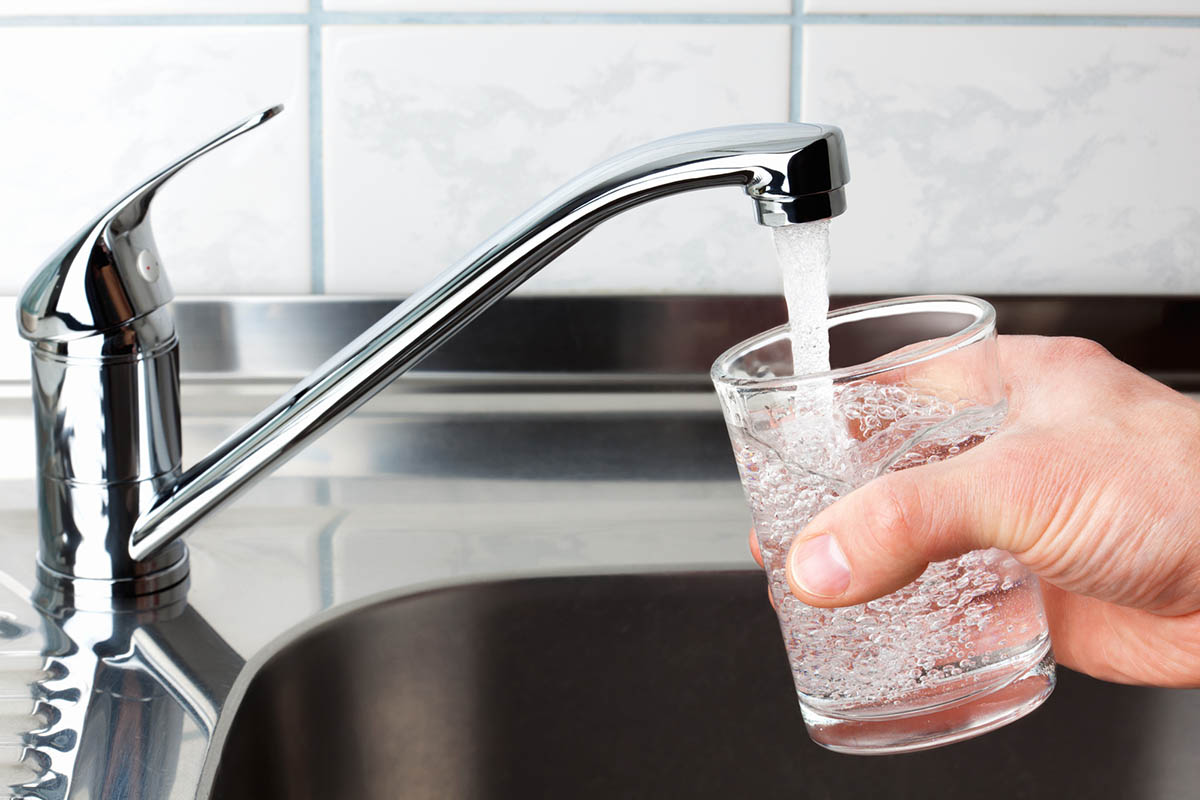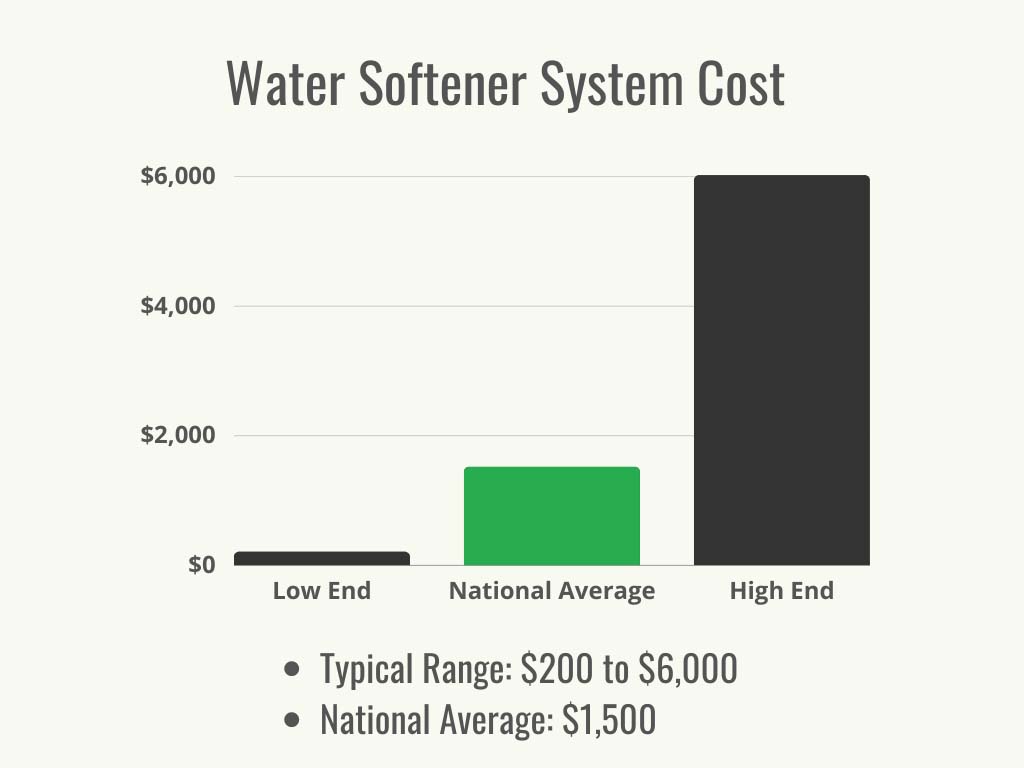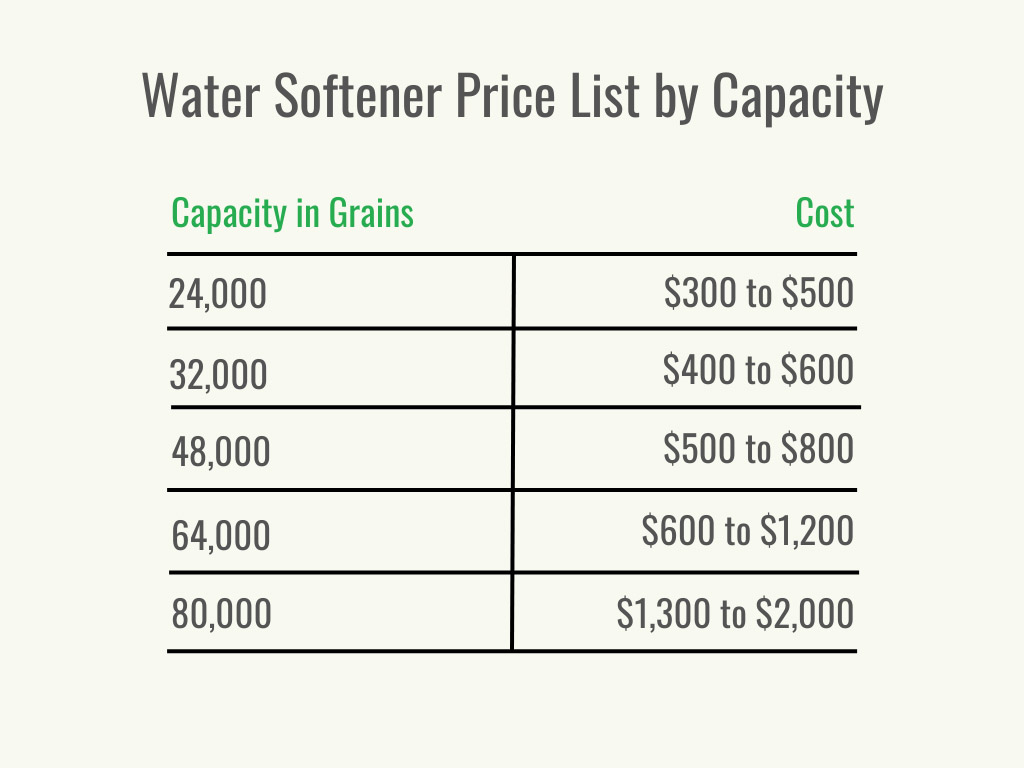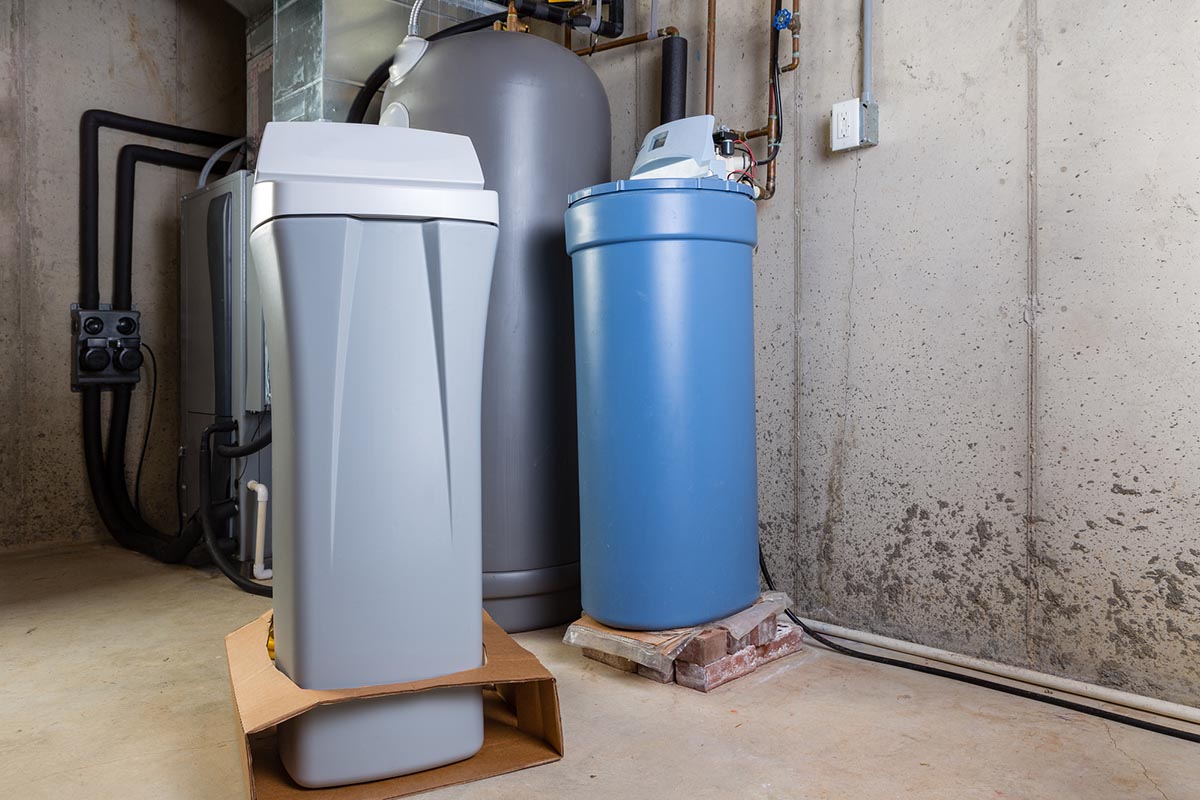

We may earn revenue from the products available on this page and participate in affiliate programs. Learn More ›
Highlights
- The typical cost to install a water softener ranges from $200 to $6,000, with a national average of $1,500.
- The water softener system type and capacity, home size, labor costs, and geographic location can all contribute to the price. Whether a homeowner chooses a whole-home or under-counter system will also affect the cost.
- Some benefits of a water softener include softer skin and hair, more efficient cleaning, less scale buildup, and better-tasting water.
- Some handy homeowners may be able to install a small under-counter water softener themselves. However, installation of whole-house units is best left to the professionals to avoid damaging the home’s plumbing.
Most homeowners don’t consider anything about the water in their house other than whether it’s running and it’s the correct temperature. What might not be common knowledge is that many households have hard water, which means it’s full of minerals that leave behind scummy residue and mineral deposits. Over time, these mineral deposits can clog pipes and reduce the water flow. In addition, residents may find that their skin and hair feels quite dry after they get out of the shower or tub due to the hard water.
Fortunately, there is a simple solution to eliminating hard water challenges: water softener systems. These handy units can neutralize or eliminate the heavy minerals from the water. Water softeners come in various configurations based on their method of mineral removal and the quantity of water that needs to be treated. According to HomeAdvisor and Angi, water softener system costs range from $200 to $6,000, but the average cost is $1,500. The type of water softener has the most significant impact on the overall price. The size of the house or plumbing system that’s being treated also affects the price, since a system for an RV won’t need to be as powerful or complex as one for a 2,500-square-foot house. Most water softener systems can be found at local hardware stores, but it’s a good idea for a homeowner to have a professional install them so that they will integrate properly with the home’s plumbing.

Key Cost Factors
When homeowners are deciding on the best water softener, it’s wise for them to consult with a pro in order to choose a system that has the capacity that’s suitable for the size of the house and the number of inhabitants. These factors, plus the type of system and the installation cost, will primarily determine water softener system costs.
System Type
There are seven effective types of water softeners: ion exchangers that use salt and brine, water distillers, and salt-free, reverse osmosis, dual-tank, well water, and magnetic systems. These vary in price from $200 to $600 at the cheapest for a magnetic system to up to $5,000 for a dual-tank model. The type and capacity will largely determine the price. The larger the capacity, the more water will be treated, and in turn the higher the cost. Water softener system types will be covered in more detail below.
System Capacity
Water softener system capacity is measured in grains per gallon, or GPG. This refers to the amount of hard water that the system is able to filter. The hardness of a home’s water as well as the number of residents will determine the capacity needed for the home. Systems with a lower GPG capacity will have a lower cost than those with a higher capacity.

Home Size
A larger house that has several bathrooms requires more plumbing than an apartment. For the system to adequately treat enough water for daily use, the capacity will need to be estimated based on grains per gallon. The grain capacity is the amount of mineral content that can be removed. Homeowners can use the following steps to calculate the size of the system:
- Multiply the number of people in the home by 90, which is the average number of gallons used per person per day.
- Multiply the result from above by the hardness of the water as listed by the local municipality. (The average is 10 grains per day, but it can range from 0 to 17.)
- Then multiply this number by 10.
For example: 3 people x 90 = 270. Multiplying 270 by 10 equals 2,700 grains per day. Multiplying by 10 once more equals 27,000. This means that the water softener would need to have at least 27,000-grain capacity. On average, a 32,000-grain water softener can work for a household of up to five people.
Whole-Home vs. Under-Counter Water Softener
If the idea of installing an entire water softener system is daunting to a homeowner, then installing a small reverse-osmosis under-the-counter unit for specific rooms might be worth consideration. This is a standard option for kitchens or bathrooms. These simpler units often cost around $150 to $600 and can be installed relatively quickly.
Labor
For traditional, whole-house systems, labor rates typically run between $150 and $1,000 for water softener installation. The cost will be on the higher end if the installation is complex and new pipes need to be run to account for the new system.
Geographic Location
Location affects the total cost homeowners pay for most installation projects. Urban areas tend to have higher labor and material rates, since there’s a higher cost of living and more demand than in rural areas. According to the U.S. Geological Survey, the specific region also affects water hardness—many parts of the western and southwestern United States have higher mineral content than many other regions. It’s important that the homeowner choose a system that works best for the mineral content in the region. Homeowners can look up “water softener installation near me” to get a sense of local prices.
Additional Costs and Considerations
Aside from the up-front system cost and labor fees, there are a few more considerations that will affect how much water softener systems cost. It will be necessary for the homeowner to have water testing done and pay for maintenance on the unit after it’s installed. Additionally, the installer may need to add electrical or plumbing features to make sure it works properly.
Permits and Inspections
A major installation may require a permit or inspection from the local authorities. They may also require that a licensed plumber perform the project. Homeowners can check with the installers or with their local municipality to see if the installation will require a permit.
Service and Maintenance
Water softener systems are complex units that utilize many parts to keep the system working correctly and safely. They require regular maintenance to make sure the water is being treated correctly. The brine tank also needs to be checked every 3 to 4 months to prevent salt buildup if the system runs on saltwater. A water softener technician will also replenish the salt or potassium as needed. Annual maintenance usually costs $100 to $300 to inspect, flush, and replenish the unit.
Water Tests
It’s important to know the current state of a home’s water content to know which water softener system is the best fit. Some local municipalities can provide a water test, or a water treatment specialist can perform a test on-site. Those who are on a well system will want to get a test that measures pH, hardness, and iron content. Well test kits cost around $10 to $40.
Framing or Electrical Modifications
A water softener system for the whole house needs to be installed near the water main. If this area is not easily accessible or a new plumbing line needs to be trenched, installation costs will quickly rise; homeowners can generally expect to pay around $0.50 to $1.00 per linear foot. Access to electricity will also be required to run the system. If there is no power nearby, it will cost about $3 to $5 per square foot for an electrician to reroute and run power to the unit.
Salt Replacement
Many water softeners use salt to treat hard water. The salt in a water softener will need to be replaced occasionally—usually every few months. The quality of salt used can make a surprising difference in how well a water softener functions, so it’s wise for homeowners to consider the best water softener salt options. A 40-pound bag of salt costs between $5 and $10. Units that are salt-free often use potassium as an alternative; a potassium replacement can cost $50 to $70.
Energy Efficiency
Different types of water softener systems work differently and can vary in energy efficiency. For example, systems that heat the water use significantly more electricity than those that do not. This will result in higher operation costs over time. It’s important for homeowners to keep these factors in mind in addition to the cost of the system itself.
Additional Features
Some water softeners come with various features such as a self-cleaning option, which means that sediment buildup will be cleared automatically. This feature can cost $300 to $1,000 extra, but it can also cut down on maintenance costs over time.
Water Softener Rental
Homeowners who prefer not to commit to purchasing a water softener may choose a rental unit, which typically costs $25 to $50 per month. This can be a suitable option for vacation homes that are not occupied year-round or for those who would like to test out a system before deciding to purchase one. Long-term rental cost, however, is more expensive than the cost to purchase a unit outright.

Types of Water Softener Systems
Identifying water usage and water hardness will make it possible for homeowners to narrow down the type of water softener that can be installed. Some water softeners work better for septic systems, and others are best for high-use households. Here is the breakdown of the cost per system.
| Type of Water Softener | Cost |
| Dual-tank | $1,000 to $5,000 |
| Ion exchanger | $500 to $3,000 |
| Magnetic | $200 to $600 |
| Reverse osmosis | $1,500 to $1,800 |
| Salt-free | $800 to $4,000 |
| Water distiller | $1,200 to $4,000 |
| Well water | $500 to $1,500 |
Dual-Tank
A dual-tank water softener can keep up with high water demands because while one tank is regenerating, the other can still supply freshly treated water. Homes that have a high water demand can benefit from this system, but it tends to be one of the priciest options at $1,000 to $5,000.
Ion Exchanger
This is the most common and reliable type of water softener. Water passes through the mineral tank, where calcium and magnesium exchange ions as they are attracted to plastic or resin beads. The beads pass into the brine tank, which is filled with salt that washes away the hard minerals and restores the beads. Ion exchanger water softener installation costs $500 to $3,000 for the unit and total installation, but these systems require regular salt refills, which is an ongoing maintenance cost.
Magnetic
A magnetic water softener uses an electrical device that is attached to the existing plumbing; the magnets create an energy field that reverses the mineral ions to prevent buildup. Magnetic water softeners are also relatively inexpensive, costing between $200 and $600 to install.
Reverse Osmosis
Those who prefer to focus on removing all minerals, chemicals, toxins, and heavy metals from their water will want to look at a reverse osmosis system. For $1,500 to $1,800 for the unit and installation, they handle mineral removal plus total water filtration for purified water that’s much safer than regular tap water. These can be installed under a kitchen sink or for the whole house, and they can work in tandem with other water softener components.
Salt-Free
A salt-free water softener or conditioner works like an ion exchange system, but it uses potassium instead of sodium, or salt. This neutralizes the minerals and suspends them in the tank rather than removing them. Potassium is gentler on septic tank systems and may also be safer for people on a low-sodium diet. Homeowners can expect to pay between $800 and $4,000 to install one of the best salt-free water softeners.
Water Distiller
A water distiller is a less common system that separates water from heavy metals and minerals by creating water vapor just before the boiling point. Since it works without filters or mineral tanks, it doesn’t effectively remove all chemicals from the water. Water distillers also work more slowly, making them a better option for a homeowner looking to improve the taste of their drinking water rather than softening water for the whole house. It costs $1,200 to $4,000 to install a water distiller system.
Well Water
Homeowners who source their water from a well will need a water softener system that is compatible with their well pump. Well water often has unique filtration needs, and one or more upgrades may be necessary for the water softener system to function. On average, homeowners can expect to pay between $500 and $1,500 for a well water softener system.
Do I Need a Water Softener System?
There are many signs that a home needs a water softener. If a homeowner notices stubborn, unattractive stains around the drains in the house, hard water is probably the culprit. White laundry growing dingy, hair and skin feeling dry all the time, and the utility bill rising are just a few of the problems caused by hard water. Homeowners can take a look at the following top reasons to get a water softener system when deciding whether to install one.
Water Test Results
Homeowners who have any suspicions about how hard their water content is can purchase a DIY water testing kit from a local hardware store. The measure to look for is milligrams per liter (mg/L) of dissolved calcium carbonate. Anything between 0 and 60 mg/L is considered soft, 61 to 120 mg/L is moderately hard, 121 to 180 mg/L is hard, and more than 180 mg/L is very hard. Results above 121 strongly indicate that a water softener system is needed to protect the pipes from mineral buildup.
Mineral Staining
As water slowly recedes down a drain, any remaining puddles will eventually evaporate and leave behind minerals. These minerals are stubborn stains that can become almost as hard as rocks. A water softener prevents these minerals from coming out of the faucets, eliminating the fight to remove hard water stains.
Scale Buildup
This same mineral buildup can also be known as scale or limescale. It can build up on shower heads, teapots, glassware, or any other surface that’s often wet. That includes inside appliances and especially inside the plumbing system. Too much buildup can eventually damage the system, causing costly repairs.
Increased Utility Bills
Sometimes the first indication of a scale buildup is higher utility bills. If the pipes have lost flow capacity due to mineral deposits, the water may push harder to get through. And if that is heated water, then the boiler or hot water heater won’t run as efficiently as it tries to keep up.
Faded Laundry
The minerals in hard water interfere with laundry detergents so they can’t clean clothes as effectively. And just as they leave scummy buildup in pipes, they do the same on clothing. This results in fading, graying, roughness, and even foul odors that never seem to wash out.
Dry Skin and Hair
Hard water is especially hard on hair and skin. It can cause dryness and even itchy, flaky skin on the scalp and body. The heaviness of those minerals often causes hair to become more dull or limp than most people prefer. The minerals can also prevent soap from dissolving normally, which means ending up with residues of soap that didn’t wash away the bacteria.
Water Heater Malfunction
The scummy, scaly buildup of minerals in pipes and drains is bound to happen in the water heater as well. Hard water often causes the premature aging of a water heating system. Electrical heaters almost accelerate the process since the heat encourages scale buildup.
Benefits of Installing a Water Softener System
Improving the water quality in a home is beneficial for more than just feeling silky smooth and clean after taking a shower—though that’s a popular reason for many users. It’s a cost-effective way to prevent long-term problems with plumbing systems while making laundry tasks more effective and water taste better.
Softer Skin and Hair
Skin and hair look and feel their best when they are not constantly weighed down by an excess of chemicals and minerals. Hair will respond better to the shampoo and conditioner and may appear less dull and limp. With a water softener system, most people experience less dry and itchy skin, which means not needing to use as much lotion.
Efficient Use of Cleaning Products
Since soap dissolves and lathers poorly in hard water, many people discover that they need less soap overall when they have softer water. Whether it’s body wash, hand soap, dish soap, or laundry detergent, cleaning products will have better cleaning and lathering power in soft water.
Less Scale Buildup
This is the best reason for a water softener system in terms of preventive maintenance. Soft water prevents the ever-growing scale and scum of hard water minerals that stick to drains, pipes, appliances, and kitchenware. The condition of pipes or appliances become a worry of the past when there is soft water running through the plumbing.
Better-Tasting Water
Many people purchase bottled water since it often tastes better than tap water. With a water softener system, tap water tastes better than most bottled water. It’s an added benefit of removing excessive minerals that influence the flavor of water.
DIY vs. Hiring a Professional
Water softener systems don’t have to be installed for the entire house. If the home’s water is only moderately hard, then perhaps a small unit installed under the kitchen sink or in the master bathroom will suffice. Homeowners may be able to learn how to install a water softener of this type, and some under-the-counter systems come with DIY installation kits. Homeowners will just want to remember that when they are working with plumbing systems, there are always risks that could lead to poor, leaky connections, or worse.
For water softener systems designed for an entire house, homeowners can bypass the risk of damaging the entire plumbing system by hiring a water softener installer. This is crucial (and possibly required by law) if any plumbing or electrical work must be added to get the system installed. The last thing anyone wants is to accidentally create a water leak that costs a lot of money to fix down the road. Qualified water softener installers will be familiar with the system they’re installing and can troubleshoot any issues that may arise during installation.
How to Save Money
It might be surprising to discover that the long-term benefits of a water softener are themselves a way to save money. Water softeners result in reduced cleaning supplies costs, increased appliance lifespan, and even lower energy bills. However, consider these tips to save money on the up-front water softener system cost.
- Ask an expert. Have a professional (or two) assess your house to help you choose the right type and capacity of water softener. Bigger isn’t necessarily better.
- Shop around. Compare costs to find a suitable unit at the right price. Also ask for quotes from multiple installation companies.
- Stick it out for a sale. Once you know the best water softener system for your house, consider waiting for a holiday promotion. The unit may go on sale, or the company could offer free installation.
- Ask about rebates. Some manufacturers may offer rebates if you spend a certain amount.
- Opt for a rental. If you’re not ready to spend big on a whole-house system, renting a water softener can be a low-cost trial option.
Questions to Ask a Pro
Since water softener systems are a long-term investment, it’s important to install the right system. During the search for a water softener installer, homeowners can use these questions to help guide the process. They’ll want to start by making sure the installer (and any subcontractors they need to hire) are licensed and insured and can provide references upon request.
- How long have you been in business?
- Do you have water testing kits available?
- Do you offer free, on-site consultations to determine how much work will be required for installation?
- Which water softener system is best for my plumbing system?
- Have you installed a system like this before?
- How much will an under-the-counter system cost to install in my kitchen and bathroom?
- How much capacity do you recommend for my household?
- What if we have guests staying with us? Will we run out of soft water?
- Will we need to install additional plumbing?
- How much maintenance will this system require?
- Do you offer a maintenance plan? If so, what’s included?
- Does this water softener come with a warranty?
FAQs
Water softener systems don’t have to be a mystery. Their benefits and cost-effectiveness have a proven history for homeowners who choose to invest in them. Homeowners who still have questions about water softener costs can consider the following answers to the most frequently asked questions.
It depends on the type and capacity of the system being installed. A typical price range is $200 to $6,000, with an average of $1,500. Smaller units that install under a sink cost less, but a smart system or one that needs significant plumbing added could cost up to $6,000 or more to install.
Homeowners have found they use less soap, detergent, and other cleaning products since they work better without the interference of hard minerals in the water. As a personal benefit, hair and skin will be less dry and itchy without the scale buildup of minerals on the skin. And finally, tap water will taste noticeably better than before.
Yes. Smaller systems are designed to fit right under a sink. That makes it possible to benefit from soft water right where it is most needed. There are also portable water softener units available that work well for recreational vehicles that have plumbing.
Angi, HomeAdvisor, HomeGuide, U.S. Geological Survey
